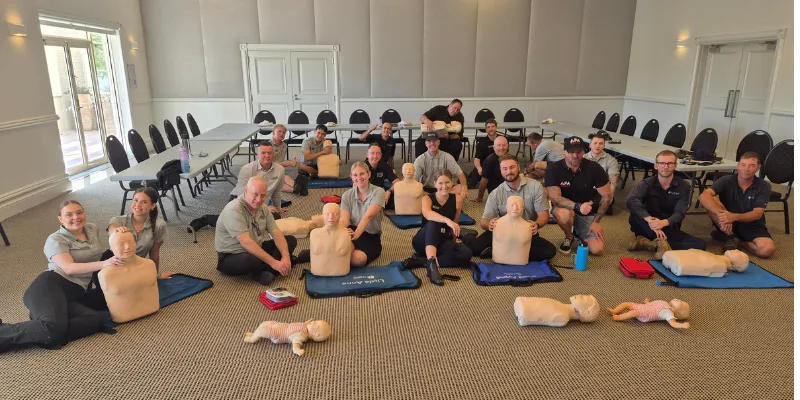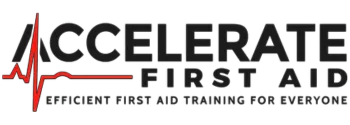
First Aid Courses for Childcare Professionals in Gold Coast
It's 3:45 PM at a busy Gold Coast after-school care center. The kids have just finished their afternoon tea when Sarah, one of our regular students, starts showing signs of an allergic reaction. Her face is getting red and blotchy. For OSHC coordinator Jessica, this isn't just another afternoon - it's exactly why having proper first aid training matters so much.
Working in childcare on the Gold Coast means you're always ready for anything. Whether you're running before-school care at 6:30 AM or managing after-school activities until 6 PM, knowing how to handle medical situations isn't just something nice to have - it's absolutely necessary.
But let's be real - finding time for first aid training when you're working split shifts isn't easy. Between managing your team, planning activities, and making sure every child is safe and happy, updating your certifications can feel like trying to find a parking spot at Pacific Fair during Christmas shopping season.
That's why I've put together this guide specifically for Gold Coast childcare professionals like you. We'll go through everything you need to know about first aid courses - from the basic requirements to finding training that actually works with your schedule (because yes, that exists!).
What makes this different from your typical first aid guide? Well, I've been exactly where you are. Running around with kids all day, trying to balance paperwork with playtime, and somehow finding time to keep all my certifications current. So everything here comes from real experience in Gold Coast OSHC centers.
Understanding First Aid Requirements for Gold Coast OSHC Workers
Let's break down exactly what you need as an OSHC worker in Gold Coast. No fancy jargon - just straight talk about the requirements that matter for your job.
What You Actually Need vs What Everyone Thinks You Need
Here's something a lot of people don't realize - not all first aid certificates are the same. Working in OSHC means you need specific qualifications that cover children's needs. The basic first aid course your mate did for their construction job? That's not gonna cut it for childcare.
The Basic Requirements (No Shortcuts Here)
HLTAID012 (Provide First Aid in Education and Care Setting)
CPR update every 12 months (yep, that's yearly)
Asthma emergency management
Child-specific response protocols
Gold Coast-Specific Rules
Working in Gold Coast OSHC centers comes with its own set of challenges. Our hot climate means we need to be extra prepared for heat-related incidents. Plus, with all our outdoor activities, we see different types of injuries compared to centers in other areas.
Local regulations require you to:
Keep your certificates on site (and easy to access)
Update your training before - not after - your current cert expires
Have at least one certified staff member present at all times (but let's be honest, more is better)
A Real Gold Coast OSHC Scenario: "Last summer, we had a kid get heat exhaustion during vacation care. Having proper first aid training meant I knew exactly what to do - get them in the shade, start cooling them down, and monitor their symptoms. It's not just about knowing what to do - it's about being confident enough to act quickly." - Jessica, OSHC Coordinator
Core First Aid Certifications Explained
Let's get into the meat and potatoes of your first aid qualifications. I'll break down exactly what each certification involves, 'cause there's nothing worse than signing up for a course and realizing it's not what you expected.
HLTAID012: Your Main Certification
This is your bread and butter certification for OSHC work. Here's what the course actually covers:
Real scenarios you'll face in OSHC (not just generic first aid)
Responding to allergic reactions (because we all know how common these are)
Handling injuries during play (from minor scrapes to more serious incidents)
Managing medical conditions specific to children
Proper documentation (because if you didn't write it down, it didn't happen!)
Duration: Usually 1-2 days, depending on whether you're doing blended learning or face-to-face.
CPR Updates: The Yearly Must-Do
Let's be real - CPR updates aren't anyone's idea of a fun Saturday morning, but they're super important. Here's what's involved:
CPR Update Checklist:
Chest compressions technique check
Breathing assessment updates
AED (defibrillator) practice
Latest guideline changes
This usually takes about 3 hours - perfect for fitting in between your morning and afternoon shifts.
Specialized Training for Common OSHC Incidents
Working in OSHC means dealing with specific types of incidents. Your training should cover:
Playground injuries (because kids will be kids)
Sports-related incidents (especially during vacation care)
Food allergies (afternoon tea time can be tricky)
Asthma episodes (particularly during physical activities)
Head bumps (they happen more often than we'd like)
Keeping Your Paperwork Straight
Here's something they don't always tell you - keeping track of your certifications is just as important as getting them. You need:
Digital copies of all certificates
Records of completion dates
Expiry date tracking
Evidence of practical assessments
Proof of current CPR certification

Finding the Right Training Provider in Gold Coast
Let's talk about where to actually get your training done. Because let's face it - when you're working split shifts, you need something that fits around your schedule, not the other way around.
Local vs Online Options: What Really Works
Face-to-Face Training in Gold Coast:
Hands-on practice with actual equipment
Meet other OSHC workers (hello, networking!)
Direct feedback from trainers
Usually in Southport, Helensvale, or Robina
Online Components:
Theory parts at your own pace (perfect for that weird gap between shifts)
Watch videos when it suits you
Practice quizzes you can redo
Less travel time
Making Split Shifts Work For You
Here's how real OSHC workers are fitting in their training:
Smart Scheduling Options:
Weekend courses (yes, they exist!)
Evening sessions after 6 PM
Split course options
School holiday intensive courses
Group Booking Benefits (Because Why Not Save Money?)
Getting your whole team certified together? Smart move! Here's what you can get:
Better rates per person
Training tailored to your center
Team building (bonus!)
Consistent information across staff
On-site training options
Comparing Local Providers
Here's a real-world comparison of what's available:
A Word About Cost
Prices vary, but here's what you should expect:
Full HLTAID012: $150
CPR Update: $55
Group discounts: Usually 10-15% off
Payment plans: Often available
Remember: Your training is tax deductible. Keep those receipts!
Maintaining Your First Aid Currency While Working
Let's get real about keeping your certifications up to date when you're juggling morning tea, playground duty, and everything else that comes with OSHC life.
Creating a Timeline That Actually Works
Nobody likes that last-minute panic when you realize your cert's about to expire. Here's a system that works:
Set phone reminders 3 months before expiry
Book your updates during quiet periods (think early school term)
Plan around vacation care dates
Match your renewal dates with your team
Making It Work With Your OSHC Schedule
We all know the struggle of fitting training around work. Here's what's working for other OSHC staff:
Smart Planning Tips:
Book CPR updates during term breaks
Use pupil-free days for training
Share shifts with colleagues during training days
Stack your training (do multiple certs in one go)
Professional Development Opportunities
Here's something cool - your first aid training can actually help your career:
Counts towards your professional development hours
Opens up senior first aid officer roles
Helps with coordinator positions
Makes you more valuable to your center

Money Matters: Getting The Most Bang For Your Buck
Let's talk about making this easier on your wallet:
Tax time benefits
Group booking discounts
Early bird rates (can save you $20-30)
Recognition of prior learning
Professional development funding
Keeping Your Skills Fresh
Between updates, try these:
Monthly equipment checks (great practice)
Run through scenarios with your team
Read up on the latest first aid guidelines
Practice with your center's emergency kit
Practical Tips for Successful Completion
Let's wrap this up with some real-world advice that'll help you nail your first aid course. No theory waffle - just stuff that actually helps.
Before Your Course
Getting ready's half the battle. Here's what to do:
Wear comfy clothes (you'll be doing CPR on the floor)
Pack snacks (brain food is important!)
Bring a water bottle
Get a good night's sleep (seriously, it helps)
During The Assessment
Here's what most people stress about - but it's not as scary as you think:
Assessment Day Tips:
Speak up if you're not sure about something
Partner with someone you're comfortable with
Take your time with the scenarios
Remember - it's about showing what you know, not trying to be perfect
Hands-On Practice That Makes Sense
You'll be practicing things like:
CPR on child-sized mannequins
EpiPen demonstrations
Bandaging techniques
Recovery position
Asthma inhaler spacing
Using Your Training In Real OSHC Life
The real test comes when you're back at work. Here's how to stay ready:
Keep the first aid kit locations fresh in your mind
Know where each child's medical info is
Practice grabbing what you need while timing yourself
Run through scenarios in your head during quiet moments
Share What You've Learned
Back at your center:
Brief your team on any new techniques
Update your emergency response plans
Check all your first aid kits match your new training
Make sure everyone knows about any procedure changes
Remember: First aid isn't just about passing a course - it's about being ready when the kids need you. Keep your skills sharp, stay confident, and you've got this!


